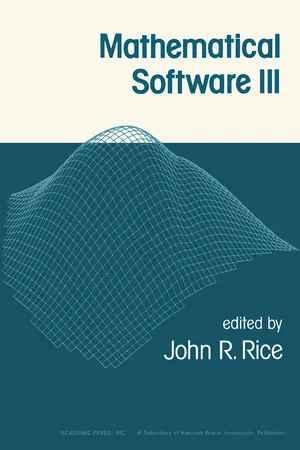
Mathematical Software
Proceedings of a Symposium Conducted by the Mathematics Research Center, the University of Wisconsin–Madison, March 28–30, 1977
- 398 pages
- English
- PDF
- Only available on web
Mathematical Software
Proceedings of a Symposium Conducted by the Mathematics Research Center, the University of Wisconsin–Madison, March 28–30, 1977
About This Book
Mathematical Software III contains the proceedings of the Symposium on Mathematical Software held in Madison, Wisconsin, on March 28-30, 1977, under the auspices of the Mathematics Research Center at the University of Wisconsin-Madison. The papers focus on software designed for mathematical applications such as LINPACK for the solution of linear systems and least squares problems and ELLPACK for elliptic partial differential equations. Comprised of 14 chapters, this volume begins with an overview of LINPACK, a software package designed to solve linear systems and least squares problems. The reader is then introduced to an extension to the exchange algorithm for solving overdetermined linear equations; infallible calculation of polynomial zeros to specified precision; and representation and approximation of surfaces. Subsequent chapters discuss the ways in which mathematical software and exploratory data analysis should interact to satisfy their respective needs; production of mathematical software; computational aspects of the finite element method; and multi-level adaptive techniques for partial differential equations. The book also describes a realistic model of floating-point computation before concluding with an evaluation of the Block Lanczos method for computing a few of the least or greatest eigenvalues of a sparse symmetric matrix. This monograph should be of considerable interest to students and specialists in the fields of mathematics and computer science.
Frequently asked questions
Information
Table of contents
- Front Cover
- Mathematical Software III
- Copyright Page
- Table of Contents
- Contributors
- Preface
- Chapter 1. Research, Development, and LINPACK
- Chapter 2. A Technique that Gains Speed and Accuracy in the Minimax Solution of Overdetermined Linear Equations
- Chapter 3. Infallible Calculation of Polynomial Zeros to Specified Precision
- Chapter 4. Representation and Approximation of Surfaces
- Chapter 5. Simulation: Conflicts between Real-Time and Software
- Chapter 6. Mathematical Software and Exploratory Data Analysis
- Chapter 7. Software for C1 Surface Interpolation
- Chapter 8. Mathematical Software Production
- Chapter 9. Computational Aspects of the Finite Element Method
- Chapter 10. The Art of Writing a Runge-Kutta Code, Part I
- Chapter 11. Multi-Level Adaptive Techniques (MLAT) for Partial Differential Equations: Ideas and Software
- Chapter 12. ELLPACK: A Research Tool for Elliptic Partial Differential Equations Software
- Chapter 13. A Realistic Model of Floating-Point Computation
- Chapter 14. The Block Lanczos Method for Computing Eigenvalues
- Index